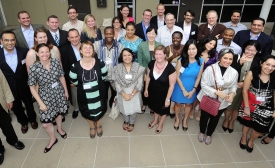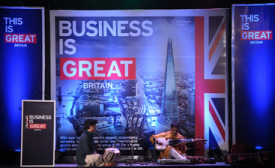public diplomacy

The Spring 2014 CPD-Journalism Forum examined the intersection of sports, journalism and international relations, as Russia plays host to the 2014 Sochi Winter Olympics (February 7-23).
Panelists:
- Derek Shearer, former ambassador to Finland; Stuart Chevalier Professor of Diplomacy and World Affairs, Occidental College
When one looks at official Canadian government policy towards Israel and Palestine, there doesn't seem to be much that is outstanding. Beyond the language on UN resolutions that provide Canada with room to protect Israel, the basic pillars are all there: Two-state solution, anti-settlements, reference to UN resolution 194 for refugees, etc. Yet, everyone knows that the Canadian prime minister's heart and soul, and his rhetoric, are firmly on one side: With Israel.

CPD's 2014 Summer Institute (July 20 - August 1) is now full.

LONDON --- If Apple, Disney, Coca Cola, and other corporate giants benefit from their carefully nurtured brands, why shouldn’t nations do the same? “Branding” is a fashionable tool on which some public diplomats rely heavily…perhaps too heavily.
Helping global publics associate a country with nice things may be useful, but emphasizing a brand for a country can be self-defeating. A nation is not a soft drink, and public diplomacy planners will find themselves getting little return on their efforts if they are satisfied with mere imagery.
The partnership between UT and the US Department of State to engage women and girls from around the world through sports was named one of the nation’s ten best public diplomacy efforts of 2013. The Public Diplomacy Council ranked the US Department of State and espnW Global Sports Mentoring Program—the flagship component of the Empowering Women and Girls through Sports initiative—as the ninth best diplomatic accomplishment in 2013.
Secretary of State John Kerry and Vice President Joe Biden will deliver remarks on 100,000 Strong in the Americas on Friday, January 17, 2014, at 2:45 p.m. at the Department of State. The event will also feature remarks by Deputy National Security Advisor Ben Rhodes, Assistant Secretary for Western Hemisphere Affairs Roberta S. Jacobson, and Special Advisor Kathleen Kennedy Townsend.
Public diplomacy fans should read the list of the 10 biggest public diplomacy stories of last year. Thanks to the University of Southern California’s Center on Public Diplomacy, we can see the global trends and how public diplomats are responding to those trends.
CPD announces the 10 most significant public diplomacy stories of 2013 as part of its review of global trends that are shaping the field. To narrow our list of 1,500 stories to 50, we took into account the following factors: the frequency of the story being covered in various news sources, the implications of the public diplomacy event, the credibility of sources publishing the news about the PD moment, and the frequency of an actor’s participation in public diplomacy activities either as the initiator or receiver of public diplomacy.







